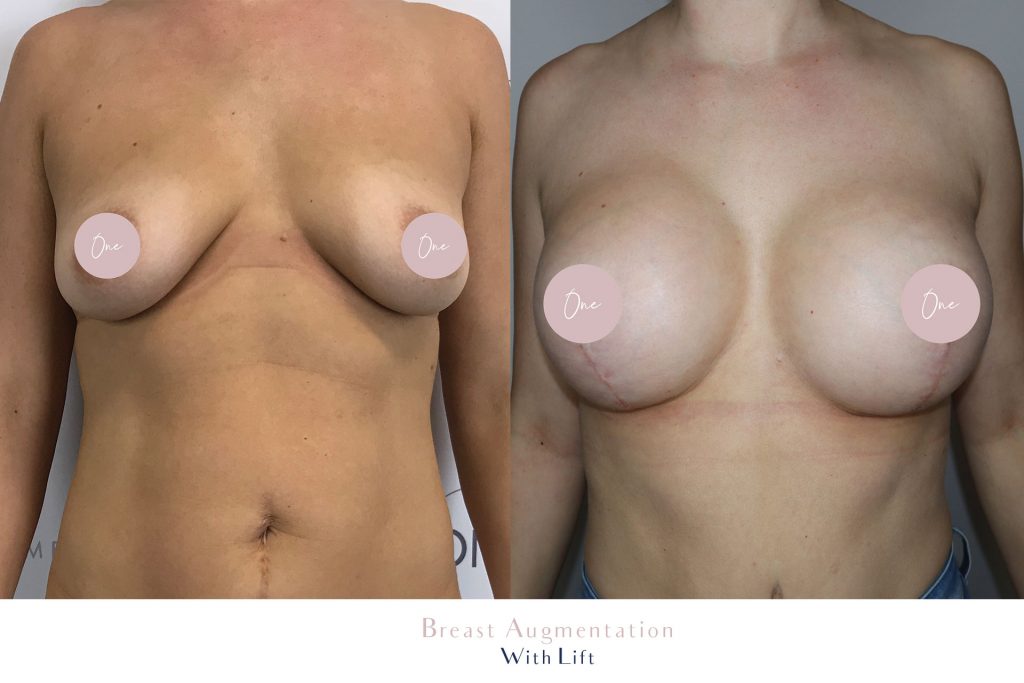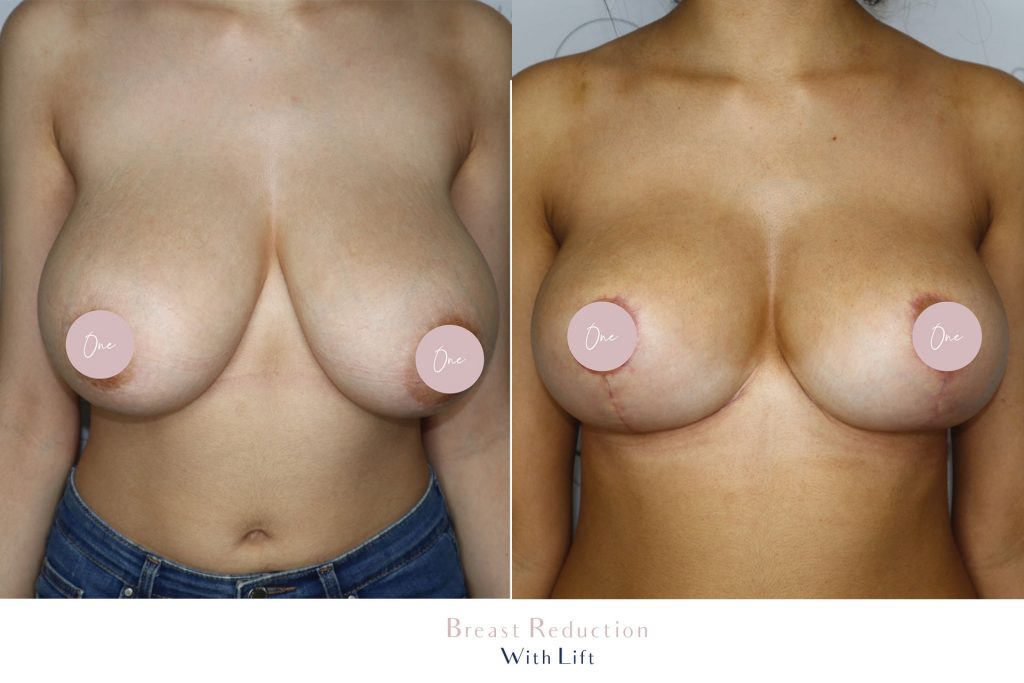Breast lift
Breast lift surgery, known as mastopexy, is a procedure that raises and firms the breasts. Excess skin is removed to tighten the surrounding tissue and to reshape and support the new breast contour. The internal breast tissue is usually reshaped as well.
The procedure is designed to help reduce sagging and loss of firmness brought on by ageing, pregnancy, breastfeeding and weight fluctuations. A breast lift can help balance the shape and size of unequal breasts, increase firmness and raise the position of downward-pointing nipples.
| Results | Last 10-15 years |
|---|---|
| Surgery time | 2- 3 hours |
| Time off work | 7-14 Days |
| Exercise | Limited for 6 weeks |
Various factors can drive individuals to contemplate undergoing a breast lift, and these motivations hinge on the specific goals and customised surgical plans of each patient. Some common reasons for seeking this procedure include:
- Pregnancy: It isn’t uncommon for pregnancy to result in certain unwanted changes in your breasts.
- Weight loss: One of the most undesirable effects of weight loss is the loss of breast volume.
- Naturally drooping breasts: a number of mastopexy candidates who have naturally drooping breasts, i.e. since the time they hit puberty.

Our breast lift surgery includes surgeons fee, hospital fee, general anaesthetic costs, compression garments and lifetime follow up care.

Before deciding whether to pursue breast surgery, you may be a good candidate for surgery if:
- You are well-supported and have realistic expectations of the surgery
- You’re able to take sufficient recovery time off of work
- You are a non-smoker or are willing to abstain from smoking at least 8 weeks before surgery and 8 weeks post-surgery
- You are 18 years or older
- You understand there are risks involved and we cannot guarantee outcomes
The decision to undertake any type of elective surgery should be a well thought and long process. We do not recommend rushing into any procedures. Below is a guide on the surgery process and the risks involved.
The first step in finding out more about breast surgery is to schedule a private consultation. In this consultation, you will meet directly with your specialist plastic surgeon. This gives you an opportunity to discuss your concerns and get all of your questions answered.
To book a surgery date you can contact our team after a face to face consultation has been completed. You must wait 7 days from the consultation to book a procedure.
During the consultation, your surgeon will delve into your medical background, inquiring about your medical history and any history of substance abuse, tobacco, or alcohol use. It’s essential to bring along a comprehensive list of all medications and supplements you are currently taking. The consultation includes a thorough examination of your complete and accurate medical history, where you’ll disclose any past surgeries, procedures, or complications you’ve encountered.
This detailed information equips your surgeon to make an informed decision about your general health and assess whether you are an ideal candidate for the procedure—fortunately, the majority of individuals meet the criteria for the intended procedure.
At the end of your consultation, your surgeon will make recommendations about the best course of action to take for your breast surgery to achieve the result you are after. Every patient is different, and results always vary. While we can look at your inspiration images, we cannot ever guarantee your post surgery results. You must take this into consideration before proceeding with breast surgery.
Once you’ve booked your surgery date, a pre surgery appointment will be scheduled 4 weeks prior to your date. This is your chance to meet with your surgeon again, ask any further questions, go over the surgery plan and take some images. This appointment ensures you’re well prepared for the upcoming surgery date.
The procedure is performed either under general anaesthesia or intravenous sedation. It begins with the removal of excess breast skin and tissue through one or more incisions in the breast area. After removing the extra tissue, the surgeon closes the incisions with stitches, and in some cases, the nipple and areola are repositioned. The breast lift surgery is typically done in one of our private hospitals and lasts between two to three hours. As an outpatient procedure, an overnight stay is rarely needed.
Breast lift procedures are typically conducted under general anaesthesia in a private hospital.
Post-surgery, you will be given a support bra or elasticated bandage to minimise swelling and provide additional support during the healing process.
In some cases, a small, temporary tube may be inserted to drain excess fluid or blood. The surgeon will provide specific instructions for recovery, covering areas such as:
- Tips for post-surgery breast care
- Follow-up appointments with the plastic surgeon
- Prescribed medications, whether applied topically or taken orally, to prevent infection and support healing
- Special care instructions for incisions and general health
It is crucial to address any specific questions about your individual recovery period. Some women opt to combine a breast lift with a breast augmentation procedure using implants, achieving both elevation and enlargement in a single surgery.
Calcium deposits in the scar capsule around the implant
Granulomas, or lumps in local lymph node tissue formed by leaking silicone
Breastfeeding difficulties, including reduced milk supply
Reduced effectiveness of breast cancer screening, since an implant may hide breast tissue (and tumours) during a mammogram
Movement of the implants from their original position
Further surgery to treat complications
Risks of anaesthesia including allergic reaction or potentially fatal cardiovascular complications such as heart attack
A blood clot in the deep veins of the legs (deep vein thrombosis), which can move to the lungs (pulmonary embolus) or to the brain and may be life threatening
- unsatisfied with surgery outcome
Surgical risks such as bleeding or infection
Fluid accumulation around the implant after surgery
Allergic reaction to suture materials, tape adhesive or other medical materials and lotions
Changes in breast and nipple sensation
Temporary or permanent areas of numbness
Wrinkling of the skin over the implant
Keloid, or lumpy scar tissue, which is pink, raised and irregularly shaped. These scars may be inflamed and itchy. There are several possible sites for the incision. Discuss this with your surgeon
Inappropriate implant size
Asymmetry (unevenness) of the breasts
Frequently Asked Questions
We regularly get asked about our procedures, so we have put together a couple of questions we get asked on a regular basis.
If there is something else you would like to know, please get in touch!
Yes, in some cases this surgery is considered a medical procedure so your private health insurance may cover your hospital costs.
In some cases, Medicare rebates are available on this procedure.
The success of your Breast Lift depends on a variety of factors including future childbirth, weight fluctuations, and ageing. Women who maintain a stable weight after their Breast Lift report results that last decades!
Individual cases may vary but generally, mothers can breastfeed after having breast surgery. However, some women do experience reduced nipple sensation following breast augmentation surgery making it difficult to trigger the milk let down reflex. Some women may also experience reduced milk supply.
Breast lift scars are an inevitable part of any invasive surgery. Dr Wessels will endeavour to minimise breast lift scars and to keep your scars as inconspicuous as possible by locating the incisions in easily hidden sites. Any breast lift scars will be along natural skin lines and creases. Breast lift scars may fade with time and become barely noticeable. If you are prone to scarring, you should advise our team.
A breast lift may be ideal for loose or elongated breast tissue. Many women can accumulate bulk in the breast area during significant weight fluctuations, including pregnancy, childbirth and breastfeeding. These changes can cause a lack of laxity in the breast area and, subsequently, sagging breasts. You will undergo a comprehensive assessment during the initial consultations to ensure breast lift surgery is suitable for you.
Yes. There are several breast lift techniques to best accommodate your needs, from crescent to peri-areolar, vertical or anchor breast lifts. During your initial consultation, your plastic surgeon will create a personalised treatment plan that considers your body proportions, skin elasticity and desired outcome.
Before & After
The images below contain content of an adult nature. If you are under 18, please leave the site now. Please be mindful that the outcomes shown are specific to these patients.

